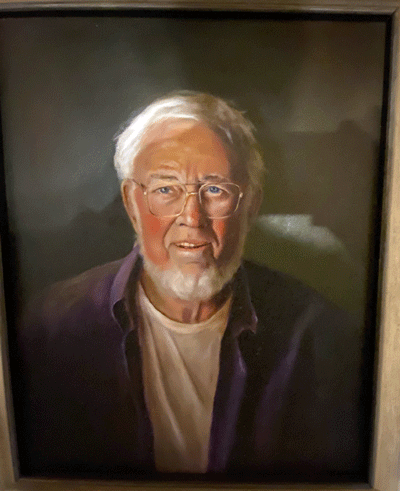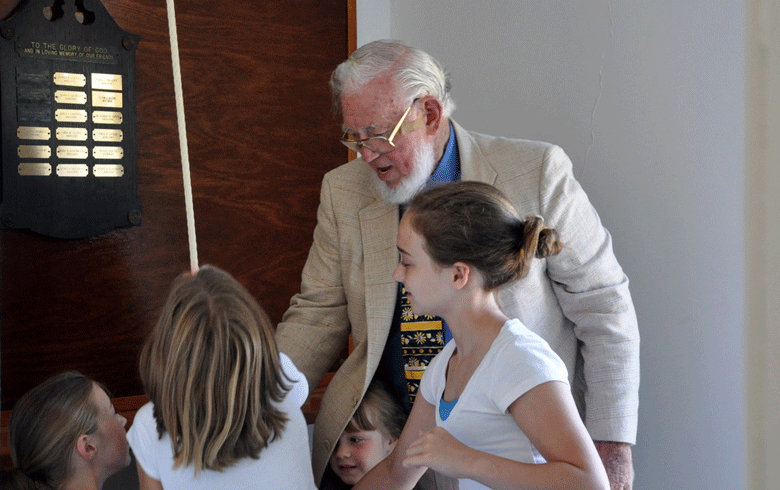What follows is an excerpt from an interview conducted, recorded, and transcribed by Kris Carlson-Lewis of Ted Hoskins at the Isle au Haut Parsonage on Aug. 22, 2012. It first appeared in a recent issue of the Isle au Haut Historical Society’s newsletter. It has been edited for length and clarity.
Ted Hoskins preached on Isle au Haut from 1961 through 2013, a period that also included a stint with the Maine Seacoast Mission, from about 1995. He reduced his preaching after 2012, taking the pulpit for the occasional Sunday. His last sermon on the island was preached in 2014.
Kris: When did you see the most significant changes on Isle au Haut over the years? Was it when the electricity came? Or telephone?

Ted: Electricity was important, telephones were important. We had quite a lot of discussion about telephones and about electricity. The summer people were worried it was going to spoil the island ‘cause you’d have these lines all over. They didn’t want to see the lines. So, a lot of them paid extra to go underground to their houses and that kind of stuff. We all had to chip in a certain amount of money to get on the power grid. Pat Tully and young Stan Dodge were key people in that.
Of course, after the war was a major change. People started coming back in greater numbers and then the boat company began…
Kris: I can remember coming up in the early 80’s and the generator would go on in the evening for a few hours. There was no phone at that time, just the ship to shore.
Ted: Well, we didn’t even have that. Somebody from Westport, Conn. would call up about this crisis or something. It would come up to Buster [Aldrich]. Buster would maybe write it down and maybe bring it out the next day. Maybe find me and maybe not. And then of course, I couldn’t answer until I went back some time.
And you knew darn good and well that by the time you got onto the mainland to make a call back, whatever the crisis was, was handled one way or the other. That was a pretty good insulation.
And then telephones came. So, I think telephones and electricity were two major changes. Of course, after the war was a major change. People started coming back in greater numbers and then the boat company began to service people more.
Stan used to run the mail boat, 25 cents you could go over. I remember when we were first here, we wouldn’t go over more than once a month to the mainland. When we first came there was a toll on the Deer Isle-Sedgewick bridge.
There was nothing in Stonington. You’d go over and there was a barbershop and there was Webb’s store. There was a garage there. And the blacksmith shops, I remember going to the blacksmith shops. There were two blacksmiths in town.
Kris: Some of the occupations that were so big over the years you don’t really see much anymore.
Ted: Nope, not much blacksmith work. Not that kind of blacksmith work. They had to work on drags and stuff like that, you know for scallops.
Kris: When did you first have a car out here?
Ted: Miss Lizzie or Miss Ava [Rich] had an old car and would let Dad borrow it. It was an old Model A or a Model T, one or the other. Maybe once a month we might go down to the pond. The end of the pond wasn’t as it is now that everyone swims down there. It was just junk then. We used to swim up at the head of the pond down below the farm. It was all mucky but nonetheless, that’s where we went.
A bunch of us kids decided to bring sand down and build a beach down there. So after church, we’d get the town truck and go over to the sand pit or gravel pit and shovel a truck full of sand and take it down and put it down. We did that time after time until we got all that sand down at the foot of the pond down there. That’s where that came from.
Kris: That’s why there’s a beach there?
Ted: We lugged that all.
Kris: So, I know when you retired from the Westport, Conn. church, you went with the Seacoast Mission. How did you find that change? Was that a positive because you really liked it along the coast?
Ted: Oh, yeah! I knew a lot of the guys and I had done enough fishing here so I could talk to the guys on other islands. I enjoyed being on the boat. I did that for about a decade, I guess. It was good. I loved it. Very, very good.





